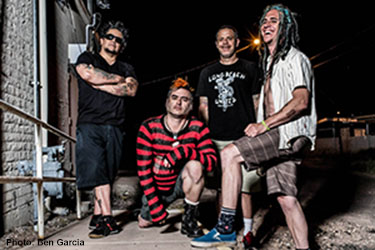Worst and Worster
In a new memoir, the punk band NOFX tells all
To many teens today, punk rock means buying a t-shirt from Hot Topic or dying their hair black. But back in the L.A. of the 1980s, calling yourself a punk could make you the target of violence. Punk gangs such as the F.F.F. or the L.A. Death Squad roamed the streets, jumping poseurs, people who got in their way, or anyone who challenged their power. In a tell-all memoir, The Hepatitis Bathtub and Other Stories, each member of NOFX recalls the energy and chaos of the early punk scene. From the band’s first show at the Cathay de Grande to their first road tour, “Fat Mike” Burkett, Eric Melvin, “Smelly” Sandin, and “El Hefe” Abeyta share a host of epiphanies.
 The overarching themes of the book are universal and inspiring, but on a concrete level this memoir is pretty raw. The book begins and ends with stories about urine, and almost every other bodily fluid imaginable is mentioned at least once. Like the band itself, the stories are either shocking, offensive, powerful, or undeniably punk rock. Told in short autobiographical sections, flip-flopping between band members’ perspectives, the book chronicles each man’s formation, from childhood to rock star. Insight into the violence and energy of the early ‘80s California punk-rock scene, sexual fetishes, dumb luck, and heroin addiction appear throughout.
The overarching themes of the book are universal and inspiring, but on a concrete level this memoir is pretty raw. The book begins and ends with stories about urine, and almost every other bodily fluid imaginable is mentioned at least once. Like the band itself, the stories are either shocking, offensive, powerful, or undeniably punk rock. Told in short autobiographical sections, flip-flopping between band members’ perspectives, the book chronicles each man’s formation, from childhood to rock star. Insight into the violence and energy of the early ‘80s California punk-rock scene, sexual fetishes, dumb luck, and heroin addiction appear throughout.
At first it’s not clear why NOFX intermingles dark family secrets with recitations about the juvenile pranks they pulled on each other. For example, Melvin writes that he was sexually abused as a child (a fact he had not revealed even to his own family, though it sent him into years of depression), but he doesn’t return to the subject later in the book or attempt any resolution of it. In another section, Burkett tells a story about a repair man who turns on the TV and inadvertently causes a pornographic video to play in front of Burkett’s mom; a few chapters later Burkett confesses to euthanizing his mother at her request. Without the drug-fueled stories of mayhem throughout, these revelations might seem inappropriate and gratuitous, but absolute candor is actually what unifies the book and makes it impossible to put down.
One of the most moving narratives in the band’s story is that of Sandin’s personal struggle with heroin addiction. His experimentation with drugs started in junior high and quickly progressed from use to distribution. By high school he was dropping acid, and a few years later a friend introduced him to heroin: “Just before he slammed down the plunger,” Sandin writes, “he looked me dead in the eye and told me my future. ‘Welcome to Hell.’” Sandin writes frankly about his life as a user, living in a closet in an apartment full of druggies, using their bathtub as a toilet (a habit that gives this book its title). Burkett eventually intervened and gave Sandin an ultimatum: get off heroin or get out of the band. Sandin’s story becomes a personal quest to maintain sobriety while continuing to do what he loved in a punk world rife with drugs.
One of the biggest bands never to sign with a major label, NOFX has been doing things their way from the start, and this book is no exception. With footnotes denoting which songs were written in honor of their fallen fellows lost to drugs or violence, this retelling of years on the road is wrought with personal struggle: “We were a van of foul-smelling, drug abusing thieves playing barely listenable music and selling fake drugs across America,” writes Burkett. “It was the worst of times, it was the worster of times.” Readers can expect a close-up of NOFX’s “worst and worster” times but also their best ones. From their humble beginnings in one of the country’s toughest punk scenes to superstardom, NOFX never fails to entertain.

Sarah Carter is a high-school English teacher living and working in Lebanon, Tennessee. She is currently an M.F.A. candidate at the Sewanee School of Letters.


